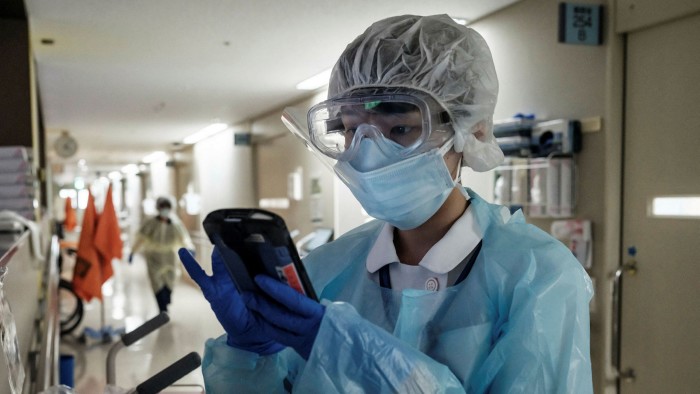How data can help prepare us for the next pandemic

Roula Khalaf, Editor of the FT, selects her favourite stories in this weekly newsletter.
Dame Sally Davies is the UK special envoy on antimicrobial resistance, convenor at The Trinity Challenge and England’s former chief medical officer
Since the start of the Covid-19 outbreak, we have witnessed remarkable innovations in healthcare, with the pandemic acting as a catalyst for digital transformation in several areas. Threat detection and monitoring has been accelerated by data-driven diagnosis, analysis and reporting.
Telemedicine — connecting health professionals and patients — is increasing. The development of the vaccines was the fastest in history, and their rollout is the largest-ever public health effort in peacetime.
It is also true, however, that despite multiple warnings — including for other epidemics — the world was simply not prepared for Covid-19.

If we are to do better next time, the collection, storage and use of data must play a core role in pandemic preparedness and the response. There are lessons that must be learnt now — for both public health and healthcare systems — and applied across all countries.
The foundation for any data-driven framework includes a reliable civil registration and vital statistics system that not only counts deaths but has the infrastructure to include the cause of death. Too often, we do not know that someone has died or why.
Healthcare and public health outcomes depend on combining clinical, genomic, laboratory and epidemiological data to guide clinical and policy decision-making.
Yet the collection of data is not enough.
Public health systems need flexible, scalable data and computing infrastructure to enable analysis, reporting and monitoring in real time. This must be done in secure environments that respect privacy and are protected from cyber security threats.
Most of the time, local and national data systems are not connected, leaving policymakers with only summary data to assess.
A new way of collecting and using data is possible, offering advantages for all countries. Indeed, the World Health Organization is considering an emergency data-sharing contract that would allow researchers to move information across borders more easily in international health crises. Similarly, leading scientific groups from G7 nations this year called for “data readiness” for health emergencies.
Future preparedness and the response efforts depend on interoperability between data systems. Enhanced preparedness and response also depends on using that data more effectively. By “use”, we should not automatically assume AI is the answer. Indeed, the AI community rushed to develop software in response to Covid-19, yet the clear consensus from the Turing Institute — the UK’s national centre for data science and AI — is that AI tools have had little, if any, effect in the fight against Covid-19.
The adage that “data out is only as good as data in” has held true, with multiple research studies finding that incorrect assumptions about data have meant that analytical models have not worked as intended.
Healthcare and public health workforces require skillsets to build complex analytical solutions, but also the ability to collaborate across disciplines to challenge and address flawed assumptions.
The use of data to identify new tools and solutions therefore depends on multidisciplinary and cross-border collaborations. These must encompass researchers, clinicians and academics, as well as non-profits and the private sector.
The Trinity Challenge, a new global health data and analytics organisation, seeks to respond to this aim. A coalition of 42 forward-thinking, pre-eminent organisations — including McKinsey, GlaxoSmithKline, Tencent, Facebook, the University of Cambridge, Tsinghua University, the Global Virome Project and the London School of Economics — have come together to identify and reward innovations from across the world.
More stories from this report
Covid raises bar for infectious disease crisis response
HIV treatments advance but vaccine remains ‘a long way off’
Governments fall behind in race to stem antimicrobial resistance
Covid provides fresh impetus to tackle global obesity
Covid mission a shot in the arm for vaccine industry
Long Covid researchers work ‘round the clock’ to solve the puzzle
Controversial virus research sparks political debate in US
Budget cuts hinder efforts to eliminate neglected tropical diseases
These data-driven solutions will strengthen pandemic preparedness and response.
Winners of the inaugural challenge this year include an app that allows livestock owners to report new symptoms of disease in their livestock; sewage sensors that can detect pathogens before cases present in humans; and an algorithm that makes sense of unused data points in routine blood tests.
Additionally, other winners included digital platforms that empower community health workers to collect and share data, dashboards that integrate case data from clinicians around the world, and blockchain-based tools that track vaccines from manufacturer to clinic.
Strengthened preparedness will not always pick up or prevent threats, however, and we will still need to respond to new infectious disease threats.
The coronavirus pandemic has led to the rapid expansion of health system capabilities. As we enter a world of endemic Covid-19, there is an opportunity to leverage these capabilities to fight other public health crises — including the slow-moving pandemic of antimicrobial resistance.
Comments